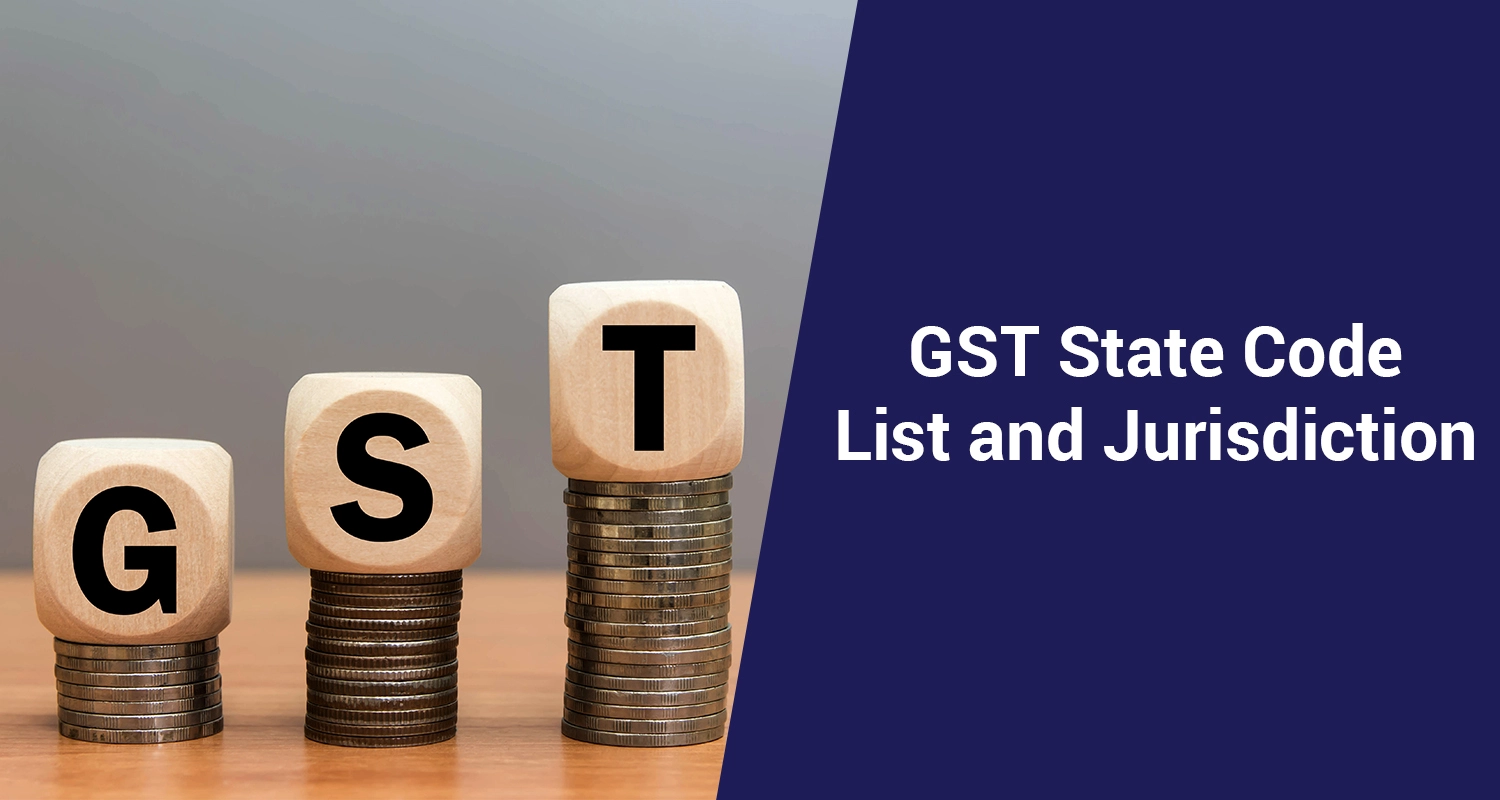GST State Code List and Jurisdiction in 2025
Table of Contents
Replacing multiple indirect taxes, the Goods and Services Tax (GST) brought a paradigm shift in the Indian tax structure. Besides streamlining tax structure, simplifying compliance, and preventing tax evasion among other benefits, it is characterized by its comprehensive, multi-stage, destination-based approach. The GST State Code list is an important component of this system. It’s simply a list that assigns a distinctive code to each state and union territory in India, which is essential for businesses and taxpayers who constitute an integral part of the GST Identification Number (GSTIN).
This article will provide you with a low-down on the GST State Code list, its importance and uses.
GST State Code Meaning
The Government of India (GOI) has serially assigned unique alphanumeric codes to the states and Union Territories in the country. For example, '03' is for Punjab, '19’ indicates West Bengal, and '33' represents Tamil Nadu. This GST Code is mentioned in the GST Identification Number (GSTIN), which is a 15-digit number that taxpayers under the GST law are assigned. The first two digits in this stand for the state code per the GST State Code list. With this list, businesses can identify the state of registration based on a GSTIN. So, if a GSTIN number is 37AAGCM1234Z5Y9, it belongs to a taxpayer from Andhra Pradesh since its first two digits are 37, the GST Code for Andhra.
The Indian government has given each state and union territory a unique code.
For example:
Punjab is '03'
West Bengal is '19'
Tamil Nadu is '33'
This code is part of the GSTIN, a 15-digit number given to businesses that pay GST. The first two digits of the GSTIN tell you which state the business is registered in. So, if a GSTIN starts with '37', it belongs to a business in Andhra Pradesh.
Sapna aapka. Business Loan Humara.
Apply NowIndia’s Complete GST State Code list
Below is the complete GST State Code list that will make it easier for you to look for a GSTIN’s state should you require.
|
State |
GST Code |
|
Jammu and Kashmir |
01 |
|
Himachal Pradesh |
02 |
|
Punjab |
03 |
|
Chandigarh |
04 |
|
Uttarakhand |
05 |
|
Haryana |
06 |
|
Delhi |
07 |
|
Rajasthan |
08 |
|
Uttar Pradesh |
09 |
|
Bihar |
10 |
|
Sikkim |
11 |
|
Arunachal Pradesh |
12 |
|
Nagaland |
13 |
|
Manipur |
14 |
|
Mizoram |
15 |
|
Tripura |
16 |
|
Meghalaya |
17 |
|
Assam |
18 |
|
West Bengal |
19 |
|
Jharkhand |
20 |
|
Odisha |
21 |
|
Chattisgarh |
22 |
|
Madhya Pradesh |
23 |
|
Gujarat |
24 |
|
Dadra and Nagar Haveli and Daman and Diu |
26 |
|
Maharashtra |
27 |
|
Karnataka |
29 |
|
Goa |
30 |
|
Lakshadweep |
31 |
|
Kerala |
32 |
|
Tamil Nadu |
33 |
|
Puducherry |
34 |
|
Andaman and Nicobar Islands |
35 |
|
Telangana |
36 |
|
Andhra Pradesh |
37 |
|
Ladakh (Newly Added) |
38 |
|
Other Territory |
97 |
|
Centre Jurisdiction |
99 |
Instances When GST State Code is Used
GST State Codes play an important role in many aspects of the GST system, including:
GST Registration: The state code is a component of the GSTIN and is used on all GST-related documents and during registration. Since the taxpayer needs to provide accurate and complete information for GST registration, it’s important to know the state and central jurisdictions for the business’s primary location. An officer verifies this information, after which the applicant is allotted a GSTIN that contains the GST state code. Check out how the GST Council governs GST registration.
Invoicing or E-Invoicing:
The code identifies the GST type—Integrated GST (IGST), State GST (SGST), or Central GST (CGST)—that will be applicable on a transaction. The GST is applied on the basis of whether the supply of a sale is interstate or intrastate GST. Transactions within the same state attract CGST and SGST, while those across states involve IGST. So, if an incorrect State Code is mentioned, it may attract the wrong charge. An incorrect state code may also result in Invoice Reference Number (IRN) cancellation and need to raise the invoice again.
Return Filing
The state code in the GSTIN helps tax authorities identify the state where a business is required to file its GST returns. This is especially important for businesses that operate in multiple states and require separate GSTINs for each location.
Understanding GST Jurisdiction
GST Jurisdiction is the geographical area that falls under a specific GST officer or state administration. On the other hand, the Center directly administers the central jurisdiction. These areas are based on regions and PIN codes, and each taxpayer falls under a specific one based on the primary place of business.
The State and Central Jurisdictions are separated on the following basis:
- 90% of the taxpayers with a total turnover below Rs.1.5 crore come under the State administration and the rest of the 10% under the Central administration.
- 50% of the taxpayers with a total turnover of over Rs.1.5 crore fall under the State administration and the other 50% is administered by the Centre.
The Importance of GST Jurisdiction
Knowing your GST jurisdiction is essential for tax return processing for businesses within their area and dispute resolution, as the jurisdiction based on your GSTIN determines the authorities who will handle the GST-related dispute cases
Classification of GST Jurisdictions
The Central and State GST Jurisdictions are classified as follows:
1.)Taxpayers with a turnover of Rs 1.5 crores and below, forming 90% of the total count of taxpayers will be considered under state administration. Rest of the 10& will fall under the category of central administration.
2.)Taxpayers with a turnover of Rs.1.5 crores and above will be divided on a 50-50 basis. 50% will fall under state administration and 50% under central administration.
These GST jurisdictions are bifurcated based on size, geographical location, hierarchy, namely -
- Zone
- Commissionerates
- Range Offices
- Division Offices
Finding Your GST Jurisdiction
Following are the ways to find your GST jurisdiction:
GST Registration Certificate: The state and central jurisdictions are mentioned in the certificate issued upon registration (Form REG-06).
CBIC Portal: Visit the "Know Your Jurisdiction" link on the Central Board of Indirect Taxes and Customs (CBIC) portal (https://cbic-gst.gov.in/cbec-portal-ui/). Select your state, zone, commission rate, division, and range to identify your jurisdiction.
Search GSTIN Tool: Use the GST portal or those of reliable entities to enter a GSTIN and find the corresponding state and central jurisdictions.
Searching State Jurisdictions in GST
Searching for State Jurisdiction in GST is quite easy. All you need to do is refer to the website of your respective State commercial tax/VAT/Sales tax and find the ward and circle to determine the State jurisdiction department.
Searching Central Jurisdictions in GST
In order to find central jurisdiction in GST, you will need to refer the CBIC portal:
https://cbic-gst.gov.in/cbec-portal-ui/?knowYourJuris
Check on the GST Registration Certificate
Before entering into any business transaction, verifying a company's GST registration is crucial. Here's how to access their GST Registration Certificate on the GST portal:
- Log on to the official GST website: www.gst.gov.in
- While you can check registration without logging in, some functionalities require a user account. Consider creating one if you need to verify certificates frequently.
- Navigate to the "Search Taxpayer" section.
- Input the company's GST Identification Number (GSTIN) along with the verification code displayed on the screen.
- Click "Search" to access the company's registration details, including the validity of its GST Registration Certificate.
How to Correct the Wrong Jurisdiction
You can request a change with the respective state's administrative or IT cell if you mistakenly selected the wrong jurisdiction during GST registration.
How to Get the Contact Details of the GST Jurisdictional Officer?
Here's how to locate the contact details of your GST officer on the gst.gov.in website:
Step 1: Go to the official GST portal: www.gst.gov.in
Step 2: Click on the "Services" tab located at the top of the homepage. Then, from the dropdown menu, select "User Services."
Step 3: Within the "User Services" options, choose "Contacts."
Step 4: On the "Contacts" page, you'll be asked to provide details about your jurisdiction. Here's what to fill in:
- Central or State: Select whether your business falls under the Central GST (CGST) or State GST (SGST) jurisdiction.
- Name of Tax Official (Optional): If you know the specific officer you're looking for, enter their name here.
- Designation of the Official (Optional): You can narrow down your search by specifying the officer's designation (e.g., Commissioner, Deputy Commissioner).
- Commissionerate: Enter the name of your Commissionerate (regional GST office).
- Division: If applicable, provide your Division within the Commissionerate.
- Range: You can further refine your search by entering your Range (a sub-division of the Division).
Step 5: Once you've filled in the relevant information, enter the captcha code displayed on the screen. Finally, click the "Search" button to view the contact details of your GST officer(s).
FAQs
Q1. Does a business need a separate GST registration for each state it operates in?
Ans. Yes, a business with physical presence (office, warehouse, etc.) in multiple states needs to register for GST in each state. Each registration will have a unique GSTIN with the corresponding state code.
Q2. What happens if a business doesn't know its GST state code?
Ans. You can find your GST state code by looking at your GST registration certificate (Form REG-06). It will be the first two digits of your 15-digit GSTIN. You can also use online tools on the GST portal or other reliable entities to find the state code using your GSTIN.
Q3. What are the penalties for using an incorrect GST state code?
Ans. Using an incorrect state code can lead to invoice rejection and the need to re-issue the invoice, incorrect tax calculation and potential demand for additional tax payment, delays in processing the GST return, and interest and penalties on any unpaid tax.
Q4. What if one is unsure about the type of GST (IGST, CGST, SGST) applicable to their transaction?
Ans. The type of GST depends on whether the supply is happening within the same state (intrastate) or across states (interstate). For Intrastate, CGST (Central GST) and SGST (State GST) will apply. Conversely, for interstate, IGST (Integrated GST) will apply. If you're unsure, you can consult a tax professional or refer to the official GST guidelines for clarification.
Q5. How does one stay updated on changes to the GST state code list or other GST regulations?
Ans. The Government of India regularly updates the GST regulations and state code list. To stay informed, visit the official GST portal (https://www.gst.gov.in/) for announcements and updates or consulting a tax professional who can advise you on the latest regulations.
Sapna aapka. Business Loan Humara.
Apply NowDisclaimer : The information in this blog is for general purposes only and may change without notice. It does not constitute legal, tax, or financial advice. Readers should seek professional guidance and make decisions at their own discretion. IIFL Finance is not liable for any reliance on this content. Read more




